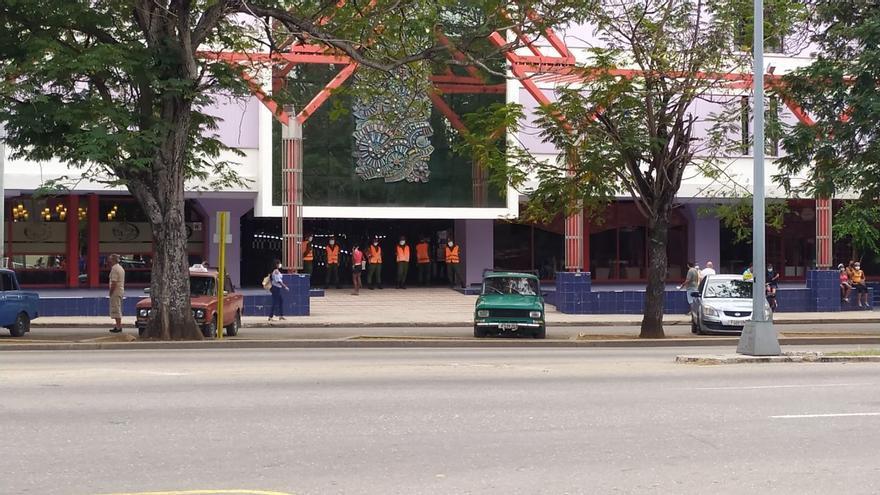
![]() 14ymedio, Havana, December 1, 2020 — The areas around several Havana stores have been under heavy guard by military and special forces troops since Monday when windows in one of the stores were smashed. Purchases at these stores, known locally as MLCs (the Spanish initials for “Freely Convertible Currency”), can only be made with foreign currency, through pre-loaded magnetic cards issued by Cuban banks. Those selling food and personal hygiene products are under the the tightest security.
14ymedio, Havana, December 1, 2020 — The areas around several Havana stores have been under heavy guard by military and special forces troops since Monday when windows in one of the stores were smashed. Purchases at these stores, known locally as MLCs (the Spanish initials for “Freely Convertible Currency”), can only be made with foreign currency, through pre-loaded magnetic cards issued by Cuban banks. Those selling food and personal hygiene products are under the the tightest security.
At the entrance to one of the city’s largest shopping malls, the centrally located Plaza de Carlos III, uniformed guards keep an eye on the entrance and on pedestrians passing by. The military presence has led to speculation by customers and area residents.
“We don’t know if it’s because the windows were broken at the hard currency store at Linea and 12th [streets] or because currency unification is about to happen and they’re preparing for public reaction,” says Liudmila Lopez, a resident of the nearby Los Sitios neighborhood.
The atmosphere in Havana has been growing more tense in recent days. Several activists from the San Isidro Movement have been on a hunger strike for more than a week, demanding the immediate closure of MLCs. They strongly distanced themselves on Monday, however, from the Panamericana store at Línea and 12th in Havana’s Vedado neighborhood.
Public resentment has risen sharply against stores such as these since they began selling food and personal hygiene products last July. The advent of this form of retail, where items can only be purchased with foreign currency debit cards, has coincided with a dramatic decline in the availability of consumer goods in stores that accept Cuban pesos (CUP) and convertible pesos (CUC). Products such as evaporated milk, cheese, butter, tomato sauce, shampoo and coffee have disappeared from the shelves of so-called “shoppings” and can now only be found at foreign exchange stores.
Last Saturday, activists called for a sit-in in front of the Ministry of Internal Commerce in Old Havana. Among their demands were that MLC stores either be closed or forced to join the network of stores that accept payment in CUC and CUP.
14ymedio has received numerous reports of the presence of so-called Black Berets, an elite military unit that the government mobilizes under special circumstances. The troops, who are armed, dressed in bulletproof vests and travel in military vehicles, have been especially visible on the city’s main thoroughfares and in various parts of the Vedado neighborhood.
“They’ve taken over the whole street,” laments a resident on 26th street near the corner of 23rd. “There are several stores here — a pharmacy and other businesses — and since we woke up, the street corners and surroundings areas have been under heavy surveillance. It is very frightening because nobody has explained what’s going on.”
The atmosphere surrounding currency unification and the MLCs has added to the simmering tension caused by calls for solidarity with the San Isidro Movement.* The government responded with a “spontaneous” demonstration in Trillo Park, which was attended by Cuban President Miguel Díaz-Canel dressed in the colors of the national flag.
“Yes or no, these are days to stay home,” says a retiree who lives near a hard currency store on Havana’s Boulevard.” I used to not go out because of the pandemic but now I don’t want to go out because there’s a lot of tension in the street and nobody knows how this is going to end.”
*Translator’s note: A dissident movement founded in 2018, many of whose members are artists, musicians, journalists and academics who oppose what they call oppressive measures by Cuba’s communist government. (Source: BBC)
____________
COLLABORATE WITH OUR WORK: The 14ymedio team is committed to practicing serious journalism that reflects Cuba’s reality in all its depth. Thank you for joining us on this long journey. We invite you to continue supporting us by becoming a member of 14ymedio now. Together we can continue transforming journalism in Cuba.
